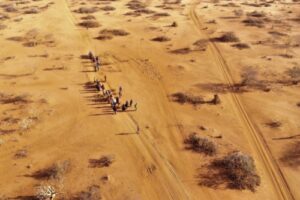
The National Interest Foundation Newsletter
Issue 166, October 27, 2022
Welcome to our NIF Newsletter. In this week’s headlines: we provide analysis into some of the critical United States House of Representatives racesto watch in the lead-up to U.S. midterm elections on November8th and their potential foreign policy-related implications, Israel appoints a settler of illegally-occupied Palestinian territory as its military chief of staff, the United Nations warns that Somalia is facing the worst famine in half a century, and an attack on a Shia religious shrine in Iran that killed at least 15 people offers proof of a troubling re-emergence of ISIS in the region.
Analysis of Key U.S. House Midterm Elections

Power struggles abound in this cycle’s U.S. midterm elections, with control of both the Senate and House up for grabs. (Photo from Getty Images)
Analysis into Critical United States House of Representatives Racesto Watch in the Lead-Up to U.S. Midterm Elections on November8th and Their Potential Foreign Policy-Related Implications
With U.S. midterm elections set to take place on November 8th, races are tightening as both parties scramble for control of the House, which is currently held by Democrats but vulnerable this year to Republican takeover. In fact, despite persistent optimism on the part of Democrats, it is likely that the GOP will be taking the reins for the next two years. Midterm elections are not kind to the president’s party, and rising inflation has not done Democrats any favors. According to expert analysis from Inside Elections, Republicans must have a net gain of only five seats to take control, but are expected to have a net gain of anywhere between eight and twenty seats. A focus on protecting the right to an abortion after the overturning of Roe vs Wade has helped Democrats make up some ground, but as it often does, the state of the economy remains the most salient issue. In a recent Pew Research poll, almost 80% of voters classified the economy as a “very important” issue. Republicans are especially concerned, with 47% of voters expressing their concern as compared to only 34% of Democrats. Still, keeping in mind that at least 24 U.S. House races are predicted to be decided by five or less percentage points, it is still anyone’s game, although it is Republicans that historically tend to upset the polling applecart.
While there are many exciting U.S. House races this cycle, a few in particular are worthy of additional note. One such race is California’s 27th district, where Republican incumbent Mike Garcia is hoping to hold onto a district where President Biden earned 55% of the vote back in 2020. Depending on the source, the district located north of Los Angeles is classified as either a toss-up or as giving a slight advantage to Garcia. On the flip side, Texas’s Democrat-controlled 15th district in the Rio Grande Valley has a good chance of flipping Republican in the wake of Trump’s victory there in 2020. Other closely-contested races include Ohio’s 1st district, Iowa’s 3rd, and Minnesota’s, Nebraska’s, and Maine’s 2nd districts. In Maine, incumbent Jared Golden (D), known for frequently going against his party’s grain, faces former Rep. Bruce Poliquin (R) in a district that Trump also won in 2020. In terms of states, Michigan is one that will be interesting to keep an eye on. The 3rd, 7th, and 8th districts are all battlegrounds in which the Democrat has a slight lead, but if one goes Republican, perhaps there will be a domino effect that may also indicate state voting patterns in 2024.
The economy, crime, immigration, abortion, and other domestic issues are taking center stage in midterm campaigns, but that is not to say that other issues are not also on voters’ minds. Foreign policy is one such backseat issue. A Pew Research poll suggests that 54% of voters characterized foreign policy as a “very important” issue. Of those, more were Republican than Democrat. However, some experts do not think that foreign policy is likely to change much in the immediate aftermath of the elections, even if Republicans secure both the House and Senate. Democrats and Republicans alike are mostly aligned on probably the two biggest U.S. foreign policy concerns at the moment, those being the war in Ukraine and wariness of China. Stopping arms sales to Saudi Arabia has bipartisan backing as well. Support for the war in Ukraine, however, does have the possibility of shifting in one direction or another with new GOP leadership. Some Republicans have called for more advanced weaponry to be sent to Ukraine, whereas others have wanted to pull some of the funding. As the economy worsens, Republican support for Ukraine is likely to weaken. Nevertheless, no dramatic change to policy is expected while President Biden remains in office.
On the other hand, analysts suggest that Republicans may begin to lay the groundwork for a president from their own party in 2024. Currently, a notable degree of evidence points to former President Trump filling that role. A Republican-occupied U.S. House and Senate would give him a powerful tool, and would likely cause sweeping changes to the way we handle issues such as energy, immigration, international organizations, Iran, and global aid. Experts project that there would be a lower commitment to protecting the environment, more domestic production of coal and nuclear energy, sealed borders, less cooperation with international organizations, staunch resistance to an Iran deal, and a decrease in global aid.
Criticism of Israel’s Illegal Settler Appointment

Rights activists have outlined the problematic ties between illegal settlers and the Israeli military. (Photo from Getty Images)
Israel Appoints a Settler of Illegally-Occupied Palestinian Territory as Its Military Chief of Staff
Rights activists have expressed criticism of Israel’s recent decision to appoint a settler of illegally-occupied Palestinian territory as its military chief of staff. Many are understandably concerned that this may further exacerbate tensions and settler violence in the West Bank. Additionally, the move highlights the problematic interconnected nature between illegal settlers and the Israeli military and government. Allowing them to hold prominent positions only regrettably serves to worsen and embolden injustices against Palestinians such as unlawful land seizures, settler attacks, and military misconduct. The recent appointment is part of a long and alarming trend of illegal settlers being given these offices of authority. There is an array of Cabinet ministers, politicians, supreme court judges, and others with similar backgrounds. 3rd Alternate Prime Minister of Israel Naftali Bennett himself is a former leader of an illegal Israeli settler group.
The Israeli military is notoriously known for committing horrible acts of violence against Palestinians. There have been many instances where the Israeli police have unjustly killed or injured Palestinian civilians, harassed them while they have been protesting, and forcibly displaced them from their homes to make way for illegal Israeli settlements. In contrast, the military protects settlements and escorts Israeli settlers when they want to visit sensitive sites in Palestinian areas or hold oftentimes provocative marches and protests. Many of the Israeli military’s top commanders are settlers occupying the stolen Palestinian land.
Settler attacks against Palestinians continue to take place at a disturbing rate, as under the protection of the Israeli military, settlers feel emboldened to act violently knowing that they will be defended if there is any retaliation from Palestinians. There are often reports of the Israeli army encouraging, instigating, and joining these attacks, in addition to even conducting their own violent military raids as well. A plethora of video and documented evidence shows soldiers often acting with settlers in carrying out violent attacks against local Palestinians. Military figures also utilize these destructive methods in an attempt to intimidate and force Palestinians to leave their homes, opening the door for the creation of new illegal Israeli settlements.
Since the illegal occupation of Palestinian territory, hundreds of thousands of unlawful settlers have moved into the West Bank. The Israeli government even goes as far as trying to lure new illegal settlers by offering what is often cheap and subsidized housing. Despite the fact that these settlements are universally deemed illegal and illegitimate by the international community, Israel has continued to construct them and push out Palestinians, with the number of settlers growing to close to 750,000. Among those is Herzi Halevi, the new chief of staff of the Israeli military. He lives in the illegal settlement of Kfar HaOranim in the West Bank. Like many of these, the settlement was built on stolen land, in this case from the Palestinian village of Saffa.
Devastating Famine in Somalia

The people of Somalia are facing a major humanitarian disaster with dire conditions not seen in more than 40 years. (Photo from AP)
The United Nations Warns that Somalia is Facing the Worst Famine in Half a Century
The catastrophic combination of drought, a decline in global humanitarian funding, conflict, and rising food prices has left around 8 million people in Somalia in desperate need of essential resources and aid services. This has prompted the United Nations to warn that Somalia is facing the worst famine in nearly half a century. The circumstances have seen a massive uptick in dry crop fields, animals dying of hunger and thirst, and the closest clean water sources being miles away from vulnerable civilians. Additionally troubling is the fact that children have been severely impacted by the humanitarian crisis, with many developing badly-damaged skin that is often broken by the swelling that accompanies extreme cases of hunger. Somalia has suffered four consecutive failures in its rainy seasons during the past two years which have exacerbated the crisis, and there are now fears that a fifth one is ongoing. U.N. officials expressed that funding estimates needed to alleviate the famine conditions have skyrocketed since the start of 2022, with aid agencies identifying multiple Somali regions where significant proportions of the population are in grave need.
Somalia is also facing a major climate disaster which has undoubtedly worsened the humanitarian crisis. The country is enduring its fifth successive failed rainy season. Alarmingly, even the next anticipated rainy season is projected to be below average, meaning that the drought emergency could devolve further. A disturbing two-thirds of the population has no access to drinking water, and more than 800,000 people have been forced to flee their homes due to drought since the start of last year. Somalia’s drought has contributed to staggering displacement, increasing violent conflicts over water and grazing land, rising costs of basic goods, and the destruction of crops and livestock herds. The nation is one of the most vulnerable and extremely drought-impacted countries in the world, and about 1.4 million children in Somalia under the age of five – over half of this segment of the population – are severely malnourished.
Persistent internal conflict in Somalia is another factor that has exacerbated humanitarian conditions amongst its citizenry. Instability has plagued the country during the preceding three decades since the collapse of the central government. Militant groups have played a destructive role in fueling instability and poverty, with instances of people often being barred from leaving them to return to their families. This is a noteworthy trend which has had a damaging effect on humanitarian circumstances, as many of those in dire need of aid are families whose members have been torn away to fight for various armed groups.
Lastly, the ongoing war in Ukraine has had a negative impact, as 90% of Somalia’s wheat imports come from Russia and Ukraine. The outbreak of conflict between these two nations has blocked critical supplies and caused prices for the products to explode. The 2022 Somalia Humanitarian Response Plan highlights how the United Nations is seeking $1.5 billion to provide humanitarian aid to at least 5.5 million people. The U.N. reports that while Ukraine’s appeal for funds has been 80% met, Somalia’s much smaller appeal has only been 30% funded. The overall aid funding for Somalia is less than half of last year’s level despite the fact that donors have sent more than $1.7 billion to respond to the war in Ukraine. The void in food exports to Somalia has left these items scarce and susceptible to large price hikes. Thus, like several other major contemporary humanitarian crises, the situation in Somalia has been worsened by the lack of global funding available due to the ongoing Russian invasion of Ukraine.
Proof of a Troubling Re-Emergence of ISIS

A terrorist attack on a notable shrine in southern Iran sparks fears that ISIS is on the rise. (Photo from Reuters)
An Attack on a Shia Religious Shrine in Iran that Killed at Least 15 People Offers Proof of a Troubling Re-Emergence of ISIS in the Region
In the spring of 2019, former U.S. President Donald Trump announced that ISIS had been eradicated from the last of their territorial strongholds in Baghouz, Syria. The proclamation was viewed as a positive development in combating the extremist group which first rose to prominence in the early to mid-2010s. Accordingly, news coverage of ISIS came to a relative halt. ISIS was no longer on every politician’s lips, and people moved on. To be sure, the group suffered major setbacks, but activity in recent years has indicated that while ISIS no longer holds wide swathes of land under its control, it remains a credible threat at the very least. Over the preceding years, ISIS has reinvented itself. What was once a pseudo-army that dominated about a third of Syria and a quarter of Iraq has now returned to its humbler roots. Like most terrorist organizations, ISIS operates in the shadows. In small bands of people, they raid villages and assassinate low-level officials, such as the mukhtars who lead villages. According to the Crisis Group, their activities “seem both inexpensive and self-sustaining.” Mukhtar assassinations also have an isolating impact on the communities they effect. In rural Iraq, mukhtars are the primary means of communication with larger entities. Without them, ISIS is able to increase their influence and spread more terror without government interference. When the government does become concerned with their dealings, ISIS evades them by taking refuge in caves, deserted towns, or other rugged terrain that makes them difficult to find and nearly impossible to confront directly.
While most analysts agree that ISIS does not have the power it once did – predominantly in regard to leverage, which requires territory – it certainly presents a different variety of threat. Furthermore, although the guerilla model of terrorism is familiar, it is nonetheless effective, especially keeping in mind the capital that ISIS built up during their peak years which the United Nations and other governments have estimated at $300 million. In addition, ISIS’s network remains both widespread and eerily large, with the UN estimating that the group has up to 30,000 foreign recruits. To this point today, ISIS conducts operations in Libya, Nigeria, West Africa, Tunisia, Egypt, Yemen, Iraq, Syria, and Iran, where at least 15 people were killed on Wednesday when three armed gunmen entered the Shah Cheragh Shrine in Shiraz, Iran, and opened fire. Two of the gunmen have since been apprehended. In the aftermath, ISIS quickly took credit for the attack, while an Iranian-affiliated news outlet supported that idea by saying that the shooting was not led by locals. As for the Iranian government’s position, they have placed blame on “takfiri terrorists,” a name that is often used for Sunni extremists.
Large-scale attacks such as these are uncommon for ISIS in today’s world, but UN Secretary-General António Guterres has expressed concern that ISIS may only be biding their time before returning to the forefront. Based on their immense resources and an uptick in activity of late, researchers agree that such a resurgence is far from an impossibility. Ultimately, ISIS is a potent threat, even from behind the scenes and with the potential for deadly attacks like the one this week in Iran.
